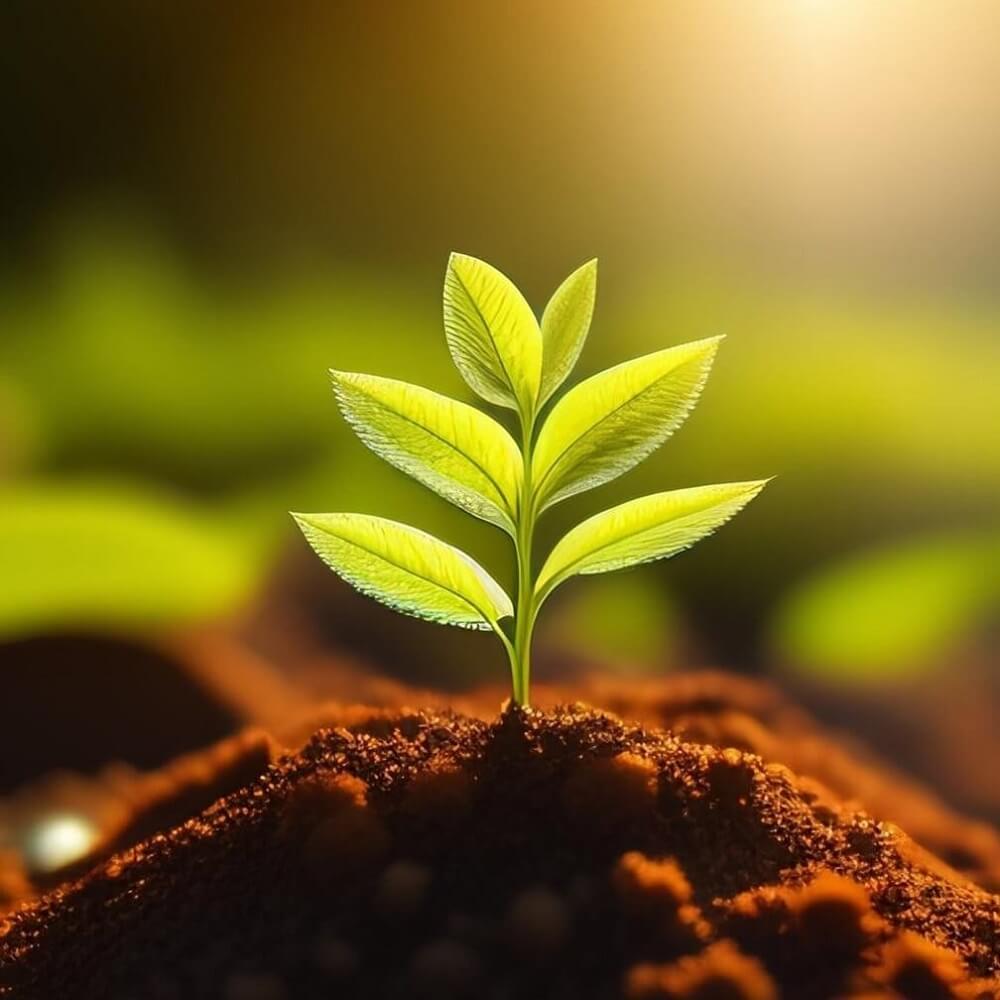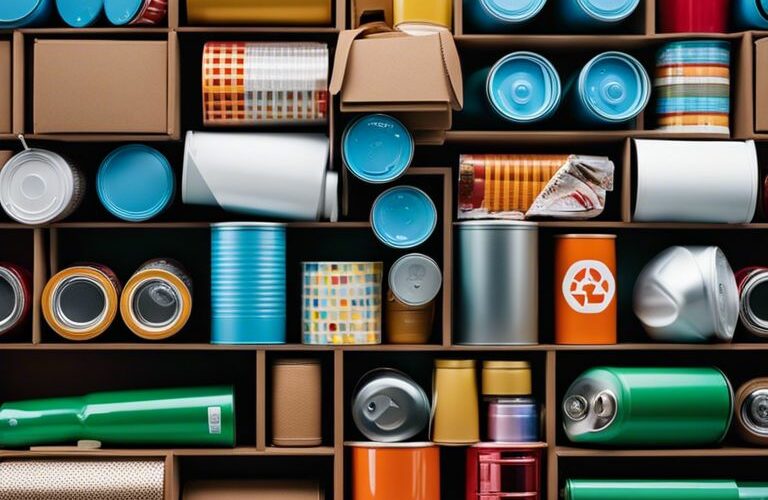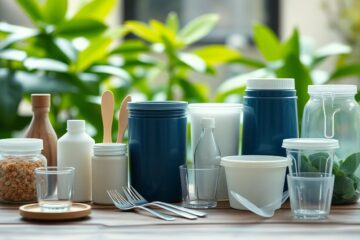The act of recycling is crucial for the health of our planet, reducing waste, conserving resources, and minimizing pollution. By properly recycling items, we can all contribute to a more sustainable future. It’s important to be aware of the items that should never end up in the trash. Knowing what to recycle can make a significant impact on our environment and our communities. Let’s explore the top 10 items that you should always recycle to help protect our planet and promote a cleaner, greener world.
Table of Contents
Key Takeaways:
- Recycling is important in reducing waste and conserving resources for a sustainable future.
- Paper and cardboard are some of the most common items that should always be recycled to help reduce deforestation.
- Plastic containers and bottles should be recycled to curb the negative impact of plastic pollution on the environment.
- Glass bottles and jars are 100% recyclable and can be reused to create new glass products.
- Aluminum cans are highly valuable in recycling as they can be infinitely recycled without losing their quality.
Paper Products
Your recycling efforts can make a significant impact on the environment, especially when it comes to paper products. Recycling paper not only helps conserve trees but also reduces energy consumption and greenhouse gas emissions. Here are the top 10 items you should always recycle when it comes to paper products.
Office Paper
Any paper products used in an office setting, such as printer paper, notebooks, and envelopes, should always be recycled. Recycling office paper not only diverts waste from landfills but also saves energy and water used in the production process. By recycling office paper, you can help reduce the environmental impact of paper production and promote a more sustainable future.
Make sure to remove any staples or paper clips before recycling office paper to ensure it can be properly processed. Additionally, consider setting up designated recycling bins in your office to make it easy for everyone to participate in recycling efforts. Note, every sheet of office paper recycled makes a difference in conserving our natural resources.
Newspapers
Paper newspapers are another necessary item to always recycle. Recycling newspapers not only saves trees but also helps reduce the energy and water needed to produce new paper products. By recycling newspapers, you are contributing to the conservation of natural resources and the reduction of waste in landfills.
When recycling newspapers, be sure to separate them from other paper products to ensure they can be properly processed at the recycling facility. Additionally, consider subscribing to electronic versions of newspapers to further reduce paper waste. Recycling newspapers is a simple yet impactful way to make a difference in environmental sustainability.
Cardboard
The humble cardboard is a versatile material that can be found in many households. It is imperative to recycle cardboard to reduce waste and help protect the environment. Recycling cardboard helps to save trees, water, and energy, making it an eco-friendly choice.
Shipping boxes
Cardboard shipping boxes are commonly used for transporting goods from one place to another. These boxes can be easily broken down and recycled to create new cardboard products. By recycling shipping boxes, you are contributing to the conservation of natural resources and reducing the amount of waste sent to landfills.
When recycling shipping boxes, make sure to remove any tape or labels to ensure they are properly processed. Flatten the boxes to save space and make it easier for recycling facilities to handle them efficiently. Remember that recycling one ton of cardboard can save over 9 cubic yards of landfill space and 46 gallons of oil!
Cereal boxes
With so many households consuming cereal on a regular basis, cereal boxes are a common item that can be recycled. These boxes are typically made of thin cardboard material that is easy to recycle. By recycling cereal boxes, you are helping to minimize the environmental impact of packaging waste.
Most cereal boxes are accepted in curbside recycling programs, making it convenient for households to recycle them. Remember to remove any plastic liners or bags from the boxes before recycling. Additionally, try to flatten the boxes to save space and make transportation more efficient for recycling facilities.
Cereal boxes are often coated with a thin layer of plastic or wax to keep the contents fresh. This coating can make it slightly more challenging to recycle cereal boxes compared to regular cardboard. However, most recycling facilities have the technology to separate the cardboard from the coating during the recycling process.
Glass Containers
Once again, one of the top items you should always recycle is glass containers. Glass is 100% recyclable and can be endlessly recycled without losing quality. By recycling glass containers, we can reduce the amount of waste in landfills and conserve energy.
Bottles
The most common type of glass container is bottles, which are used for beverages like wine, beer, and soft drinks. The recycling process for glass bottles helps to save raw materials and reduce carbon emissions. When glass bottles are recycled, they are crushed, melted, and molded into new products, reducing the need for new glass to be made.
By recycling glass bottles, we can also save energy. It takes less energy to melt recycled glass than it does to melt raw materials to make new glass. This means that recycling glass bottles not only conserves resources but also helps to lower greenhouse gas emissions.
Jars
To further contribute to glass recycling, jars used for storing food items like jams, sauces, and pickles should also be recycled. Recycling glass jars helps to prevent waste and protect the environment. The glass in jars can be recycled repeatedly without losing its quality, making it a sustainable choice for packaging.
With the growing concern for reducing plastic pollution, using and recycling glass jars can be an eco-friendly alternative. Glass jars are non-toxic and do not leach harmful chemicals into the environment, making them a safe option for food storage and recycling.
Aluminum Cans
For those looking to make a positive impact on the environment, recycling aluminum cans is a simple yet effective way to reduce waste and promote sustainability. Aluminum is one of the most valuable materials to recycle, as it can be recycled indefinitely without losing its quality. By recycling aluminum cans, you are not only conserving natural resources but also saving energy and reducing landfill waste.
Soda Cans
Any time you finish a soda can, remember that it can be recycled and turned into a new product within as little as 60 days. The recycling process for aluminum cans uses significantly less energy compared to producing new cans from raw materials, making it a much more eco-friendly choice. Additionally, recycling aluminum cans helps reduce greenhouse gas emissions and the extraction of bauxite, the primary source of aluminum.
For those who enjoy carbonated beverages, recycling soda cans is a small but impactful step towards a more sustainable future. By simply tossing your empty soda cans into the recycling bin, you are contributing to the conservation of natural resources and reducing the carbon footprint associated with aluminum production.
Beer Cans
For beer enthusiasts, recycling beer cans is equally important in the effort to minimize waste and protect the environment. Beer cans are typically made of aluminum, which is why they are highly recyclable and sought after by recycling facilities. By recycling beer cans, you are not only keeping them out of landfills but also ensuring that the valuable metal is reused in the manufacturing process.
For instance, the production of new aluminum cans from recycled material consumes 95% less energy compared to using raw materials. This significant energy savings translates to reduced greenhouse gas emissions and a more sustainable approach to manufacturing. So, next time you enjoy a cold beer, remember to recycle the can responsibly to support a healthier planet.
Steel Cans
Keep steel cans at the top of your list when it comes to recycling. These versatile containers are used for a variety of products, such as food items, beverages, and household goods. They are durable and easily recyclable, making them a sustainable choice for packaging.
Food Cans
To ensure that steel food cans are properly recycled, make sure to rinse them out before tossing them into the recycling bin. This helps prevent contamination and ensures that they can be processed efficiently at the recycling facility. By recycling food cans, you are diverting waste from landfills and contributing to the circular economy.
An important thing to note when recycling steel food cans is that the labels do not need to be removed. These labels are typically made from materials that will be burned off during the recycling process. This makes it easier for you to recycle these cans without the need for extra steps.
Soup Cans
An necessary part of recycling steel soup cans is flattening them before disposal. This not only saves space in your recycling bin but also helps the recycling facility process them more efficiently. Flatten the can by stepping on it or using a tool to crush it down.
Any leftover soup residue should be rinsed out before recycling to prevent odors and attract pests. By taking these simple steps, you can ensure that your steel soup cans are recycled properly and contribute to a more sustainable environment.
Plastic Bottles
All plastic bottles, whether they held water, milk, juice, or other beverages, should always be recycled. Recycling plastic bottles helps to conserve raw materials, reduce energy consumption, and lessen the amount of waste that ends up in landfills. By recycling these items, we can make a positive impact on the environment and contribute to a more sustainable future.
Water Bottles
Plastic water bottles are one of the most common types of plastic bottles found in households. They are typically made from polyethylene terephthalate (PET) plastic, which is widely recyclable. By recycling water bottles, we can reduce the amount of plastic pollution in our oceans and waterways. Additionally, recycling these bottles helps to conserve natural resources and save energy that would be used in the production of new plastic products.
Milk jugs are another type of plastic bottle that should always be recycled. These containers are usually made from high-density polyethylene (HDPE) plastic, which is also widely recyclable. When we recycle milk jugs, we prevent them from ending up in landfills where they can take hundreds of years to decompose. Recycling milk jugs also helps to reduce the need for virgin plastic production, which in turn lowers greenhouse gas emissions.
Milk Jugs
With the growing concern over plastic pollution and its impact on the environment, it is more important than ever to recycle milk jugs. These containers can be recycled into new products such as plastic lumber, compost bins, and more. By recycling milk jugs, we can contribute to a circular economy where materials are reused and repurposed rather than disposed of after a single use.
Plastic Containers
After paper, plastic is one of the most common materials found in the recycling stream. By recycling plastic containers, you can help reduce the amount of plastic waste that ends up in landfills or oceans. It’s important to recycle plastic containers properly to ensure they can be processed and made into new products.
Yogurt Tubs
One common plastic container that should always be recycled is yogurt tubs. These containers are typically made from #5 plastic, which is recyclable. Make sure to rinse out any remaining yogurt before tossing the tub in the recycling bin. By recycling yogurt tubs, you are helping to conserve energy and reduce the demand for new plastic material.
Yogurt tubs can be melted down and used to make new plastic products, such as containers, bottles, and even clothing. By recycling these containers, you are helping to close the loop on plastic production and minimize the environmental impact of plastic waste.
Butter Tubs
An often overlooked plastic container that should always be recycled is butter tubs. These containers are usually made from #2 plastic, which is commonly accepted by recycling facilities. Just like yogurt tubs, be sure to clean out any leftover butter before recycling the container.
Butter tubs can be recycled into new plastic products, reducing the need for virgin plastic materials. By properly recycling these containers, you are contributing to a more sustainable future and helping to protect the planet from the harmful effects of plastic pollution.
When recycling butter tubs, remember to check with your local recycling guidelines to ensure they accept #2 plastics. It’s important to separate lids from containers and always rinse them out before recycling to prevent contamination and ensure they can be processed efficiently.
Electronics
Despite the convenience and efficiency of electronics, their disposal can pose a significant threat to the environment. Recycling electronic devices is crucial to reduce the amount of electronic waste ending up in landfills and to recover valuable materials for reuse.
Cell phones
Any old cell phones lying around your home should never be thrown in the trash. These devices contain toxic materials like lead, mercury, and cadmium that can leach into the soil and water sources if not properly disposed of. Recycling cell phones ensures that these hazardous substances are safely extracted and reused, minimizing their impact on the environment.
Moreover, recycling cell phones allows for the recovery of precious metals such as gold, silver, and copper, which can be reused in the manufacturing of new electronic devices. By recycling your old cell phones, you are not only protecting the environment but also conserving valuable resources.
Computers
For any old computers or laptops that you no longer use, recycling is the only responsible way to dispose of them. Computers contain components that can be highly toxic if not handled properly, including lead, mercury, and arsenic. Simply throwing these devices in the trash can lead to environmental contamination and health risks.
The proper recycling of computers involves dismantling the devices to recover valuable materials such as metals, plastics, and glass. These materials can then be used to manufacture new products, reducing the need for raw materials extraction and the energy consumption associated with production.
Computers also often contain personal information that needs to be securely erased before recycling. Working with certified e-waste recyclers ensures that your data is properly wiped to protect your privacy. Recycling computers not only safeguards the environment but also safeguards your personal information from falling into the wrong hands.
Batteries
Many everyday items we use rely on batteries to function, from small electronics like remote controls to larger devices such as cars. It’s crucial to recycle batteries properly to prevent environmental harm and conserve valuable resources.
Car batteries
Batteries used in cars, also known as lead-acid batteries, are extremely hazardous if not disposed of correctly. These batteries contain chemicals like lead and sulfuric acid, which can leak and contaminate soil and water sources if not recycled properly.
When you recycle car batteries, the lead and acid can be safely extracted and reused in the production of new batteries. Many auto parts stores, scrap metal recyclers, and government waste management facilities accept old car batteries for recycling.
Rechargeable batteries
The proliferation of portable electronic devices means that rechargeable batteries are increasingly common. These batteries, including lithium-ion and nickel-metal hydride types, should never be thrown away with regular trash.
The components of rechargeable batteries can be toxic and harmful to the environment if not handled properly. When recycled correctly, valuable metals like lithium, cobalt, and nickel can be recovered and used to create new batteries or other products.
With proper recycling programs and collection sites readily available, there is no excuse to dispose of batteries in the regular trash. Take the extra step to keep our environment safe and conserve resources by recycling all types of batteries responsibly.
Summing up
Conclusively, it is crucial for everyone to be mindful of recycling to protect our environment for future generations. By always recycling items such as glass, paper, plastic, and electronics, we can reduce waste, conserve resources, and reduce the environmental impact of our consumption. Bear in mind, recycling is a simple yet powerful action that each of us can take to make a positive difference in the world. Let’s all do our part by incorporating these top 10 items into our recycling routines.
FAQ
Q: Why is recycling important?
A: Recycling is important because it helps reduce waste, conserves natural resources, and prevents pollution. By recycling, we can protect the environment for future generations.
Q: What are the top 10 items you should always recycle?
A: The top 10 items you should always recycle are paper, cardboard, plastic bottles, glass bottles, aluminum cans, steel cans, newspapers, magazines, junk mail, and electronics.
Q: How can recycling benefit the environment?
A: Recycling benefits the environment by reducing the amount of waste sent to landfills, conserving energy, saving natural resources, and lowering greenhouse gas emissions. It helps protect ecosystems and wildlife habitats.
Q: What happens to items after they are recycled?
A: After items are recycled, they are processed and turned into new products. For example, recycled paper can be used to make new paper products, and recycled plastic bottles can be turned into new plastic containers or clothing.
Q: How can I start recycling at home?
A: To start recycling at home, you can set up separate bins for recyclables, such as paper, plastics, glass, and metals. Make sure to rinse out containers before recycling them and check with your local recycling program to see what materials they accept.

Our contributing author is a passionate advocate for eco-friendly living and sustainability. With a background in eco-life, they are dedicated to inspiring and empowering individuals to adopt environmentally conscious lifestyles. Through insightful articles, they share practical tips, innovative solutions, and thought-provoking perspectives to promote a greener, more sustainable world. Join them on the journey towards eco-smart living and discover how small choices can make a big impact. 🌱








